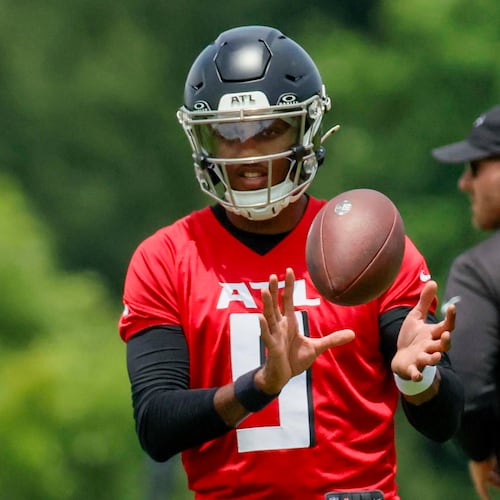There are clean lines in the flow chart in New England and Seattle. There is a befuddling ball of twine in Atlanta.
In 2000, New England owner Bob Kraft wanted Bill Belichick as his head coach so much that he traded a first-round draft pick to the New York Jets for his rights and told Belichick, “You’re in charge of everything.” The result has been six Super Bowl appearances and three championships.
In 2010, Seattle owner Paul Allen was so convinced that Pete Carroll would fix his franchise that he and a search committee pre-selected four general manager candidates and told Carroll, “Pick the one you want,” and gave Carroll final say on everything. Carroll, after two previous failures as an NFL head coach under extraordinarily different circumstances, will try to win his second consecutive Super Bowl on Sunday.
The flowchart: So clean. So simple. So successful.
The Patriots and Seahawks sit atop the NFL world because their respective owners picked great leaders to run their football operations. Then they were smart enough to get out of the way.
The Falcons have been doormats for the past two years, going 10-22 after five consecutive winning seasons, even if lacking in postseason success. But the most troubling aspect of their situation isn’t their record since 2012, but the uncertainty of who’s really in charge — other than, obviously, owner Arthur Blank, who as of this past season still held a weekly meeting with his general manager and coach every Monday.
The Falcons’ organization employs four current or former general managers (Thomas Dimitroff, Scott Pioli, Rich McKay, Billy Devaney). Blank also recently solicited the help of former Philadelphia general manager Joe Banner as an adviser before the coaching search, as well as hiring a national search firm for coaching candidates — because four current or four GMs, Google and logic must not be enough.
Dimitroff used to oversee the draft and free agency. Now that’s under Pioli, even though Dimitroff remains the general manager over Pioli. Dan Quinn, the Seattle defensive coordinator who will be announced as the team’s head coach Monday, was hired by Blank. It’s believed Quinn was Dimitroff’s first choice. However, Dimitroff didn’t have nearly as much power in this coaching search as when he hired Mike Smith in 2008. There’s also a chance that Quinn will get final say over the 53-man roster. Dimitroff and Quinn will report separately to Blank.
You following this?
Carroll and his hand-picked general manager, John Schneider, have been a remarkable success story. They’ve brought a fresh approach to how to build an NFL hierarchy, and their ability to spot and develop talent is illustrated by the number of low-round draft picks in the starting lineup, particularly on defense. It has been a surprising turnaround for Carroll, who pitched the concept to Allen. He failed in two previous NFL head coaching jobs with the Patriots (their head coach before Belichick) and the New York Jets, but enjoyed enormous success at USC.
When Carroll was with the Patriots, he had little say over personnel decisions and had a dysfunctional relationship with general manager Bobby Grier. He said the Seahawks’ front office setup, “came out of the years at (USC), where you have an athletic director and then you’re the football guy. I had the opportunity there to make every decision from recruiting to academics to everything, and you’re responsible for all of that. That is why I thought that would be the only job that I liked, because I felt like it really gave me an opportunity to be at my best. When the (Seattle) opportunity came up, it was expressed and clearly laid out that I could have the same kind of responsibility and the same kind of approach. So it’s been really instrumental, because the way we do things isn’t the way a lot of other people do things. We needed our own language and our own control and our own decision-making process. It’s made all the difference in the world for us.”
Quinn isn’t expected to be given as much autonomy as Carroll. But, “It’s what every coach needs to be at his best,” Carroll said. “The format and the structure that is generally accepted in the league is not that. I understand why. But this is a football game that we play. There’s a business that goes along with it, but the football has to be run by the football people. I thought this was an extraordinary opportunity from the day that I arrived in Seattle to prove that. We’ve set out to kind of show that this is the way organizations can be run.”
Bill Parcells was the Patriots coach when Kraft bought the team in 1994. When Parcells went to the Jets, Kraft hired Carroll. Parcells wanted to promote his defensive coordinator, Belichick, to the Jets’ head coaching job in 2000, and Belichick technically was the head coach for one day but then he “resigned,” preferring the Patriots’ job.
The league ruled Kraft would have to compensate New York, and that was acceptable to Parcells, who received a first-round draft pick. The draft pick turned out to be a solid player, defensive end Shaun Ellis, but not a Hall of Famer like Belichick.
Kraft is one of the league’s most respected owners and individuals, but he yields to Belichick in all football matters.
“We all make mistakes, we all have weaknesses,” Belichick said. “But I think we can try to address those and improve on that or possibly make them strengths. That’s kind of the backbone of our program. I’ve been fired a couple times myself. I’ve had a couple ups and downs there. But through it all there is always something to be gained and learned from those experiences.”
Belichick and Carroll have learned from their failures. The Falcons are still figuring it out.
About the Author
Keep Reading
The Latest
Featured


